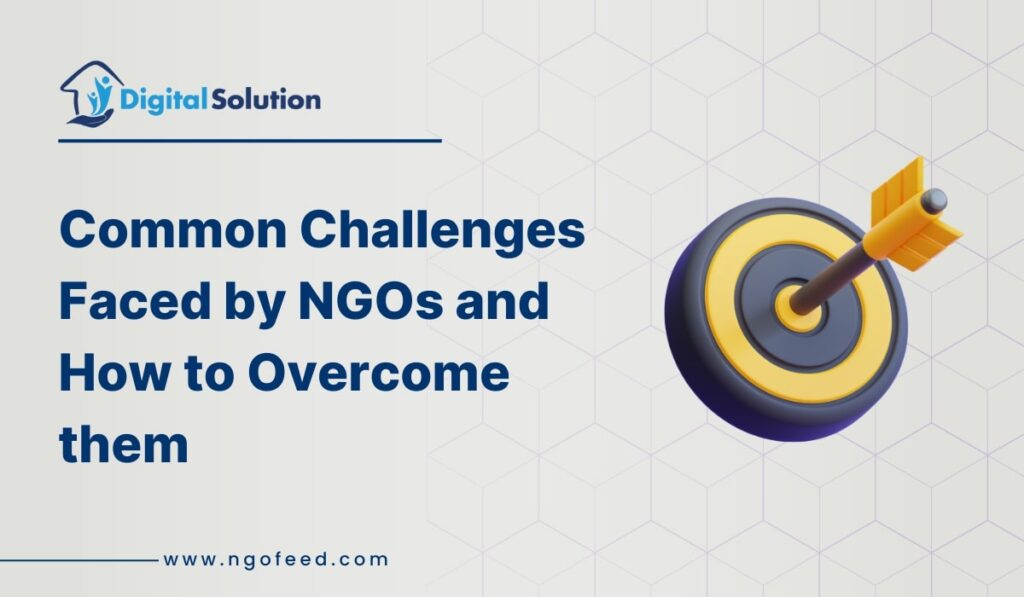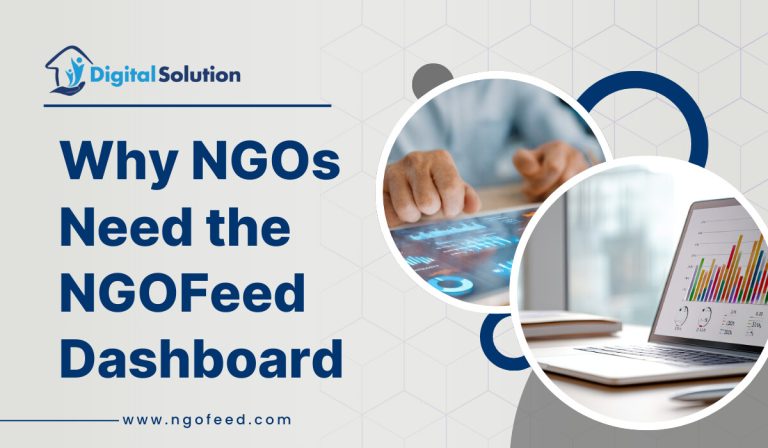Common Challenges Faced by NGOs and How to Overcome Them: Non-Governmental Organizations (NGOs) have an important role in social development, humanitarian assistance, environmental protection, health care, education and advocacy. NGOs serve as a liaison between the government and community, making the voices from marginalized groups heard. However, despite their strong commitment and grassroots outreach, NGOs around the world, particularly in developing economies like India, experience challenges whether operational, financial, or structural, that could impact their sustainability and effectiveness.
Table of Contents
Common Challenges Faced by NGOs and How to Overcome Them
This article discusses some of the primary challenges faced by NGOs, and suggests to overcome them with a view to aiding NGOs in their long-term growth and community-level impact.
1. Financial Volatility and Unsustainable Funding
The Challenge: One of the greatest ongoing challenges that NGOs face is financial volatility. Most NGOs rely heavily on donations from outside sources, grants or government funding which is, more often than not, inconsistent and project-based. When this funding runs out, they find it difficult to continue their work, pay staff or scale their programs. Financial instability is made worse during global economic downturns, donor fatigue and changes in priority funding.
Also Read: Gen Z Volunteering: How a Generation Is Reshaping Service and Social Good
How to Overcome It
- Diversifying Funding Sources: Rather than relying on a single donor, NGOs should explore more than one stream of revenue, including corporate partnerships (e.g. CSR funds), crowdfunding efforts, membership drives and social enterprises.
- Establish Long-Term Donor Relationships: Transparency, timely reporting and showcasing impact through success stories can build donor trust and encourage continued support.
- Develop Self-Sustaining Projects: Implement income-generating programs (like handicraft sales, training services or agricultural cooperatives) that help the NGO earn revenue while empowering beneficiaries.
- Leverage Digital Fundraising: Using digital tools, social media and online campaigns can attract global donors and small-scale contributions.
2. Poor Governance and Leadership Issues
The Challenge: Many NGOs lack strong leadership structures, leading to poor governance, mismanagement of funds, and internal conflicts. Weak decision-making and unclear roles within the organization can reduce efficiency and credibility. In some cases, NGOs are founded by passionate individuals but fail to transition into professionally managed organizations as they grow.
How to Overcome It
- Build a Transparent Governance Structure: Clearly define roles, responsibilities and reporting hierarchies among board members and staff.
- Invest in Leadership Development: Provide leadership training and capacity-building workshops for both senior and mid-level managers.
- Encourage Accountability: Regular internal audits, performance evaluations and external reviews can help maintain integrity.
- Create Advisory Boards: Including experienced professionals from various fields ensures diverse perspectives and strategic decision-making.
Also Read: Volunteers Vs Paid Staff in NGOs: Pros and Cons
3. Inadequate Human Resource Management
The Challenge: NGOs often operate with limited budgets, making it difficult to hire skilled professionals or retain experienced staff. Many rely on volunteers or underpaid workers who may lack long-term commitment. High staff turnover disrupts projects, reduces institutional memory and affects morale.
How to Overcome It
- Offer Non-Monetary Benefits: Flexible work arrangements, training opportunities and recognition programs can improve employee satisfaction.
- Encourage Capacity Building: Regular workshops, skill enhancement programs and exposure visits can motivate staff and improve efficiency.
- Volunteer Management Systems: Build structured volunteer programs with clear roles, orientation and appreciation mechanisms.
- Promote a Positive Work Culture: Creating a sense of belonging and purpose can retain passionate employees even with limited financial rewards.
4. Limited Access to Technology and Data Management
The Challenge: In an increasingly digital world, many NGOs still struggle with poor technological infrastructure, outdated systems and limited digital literacy. This hinders effective communication, data collection, monitoring and impact assessment. Without reliable data, NGOs find it hard to convince donors or measure their success.
Also Read: How NGOs Are Using Theatre for Gender Sensitisation in Rural Areas
How to Overcome It
- Adopt Digital Tools: Use free or low-cost platforms for project management, communication and fundraising.
- Invest in Data Systems: Use simple data collection tools like Google Forms to record impact metrics.
- Partner with Tech Companies: Collaborations under CSR can help NGOs access software, cloud services and training.
- Enhance Digital Literacy: Regular workshops on digital tools, cyber security and data handling improve overall efficiency.
5. Lack of Awareness and Visibility
The Challenge: Many NGOs do outstanding work but remain unknown outside their local communities. The absence of a digital presence, limited media coverage and poor communication strategies restrict their ability to attract donors, volunteers or policy support.
How to Overcome It
- Build a Strong Brand Identity: Create a clear logo, mission statement and consistent visual presence across social media and print materials.
- Utilize Digital Marketing: Engage audiences through storytelling, videos, blogs and social media campaigns that highlight real-life impact.
- Network and Collaborate: Attend conferences, collaborate with other NGOs and engage influencers to expand reach.
- Media Partnerships: Regular press releases, interviews and case studies can help generate awareness and credibility.
Also Read: CSR Vs Philanthropy Vs Charity: What’s the Difference?
6. Compliance and Legal Challenges
The Challenge: NGOs must navigate complex legal frameworks involving registration, tax exemptions, FCRA (Foreign Contribution Regulation Act) compliance and other government reporting requirements. Lack of awareness or non-compliance can lead to penalties, license cancellations or frozen bank accounts.
How to Overcome It
- Stay Updated with Regulations: Regularly check government portals (like NGO Darpan, MCA or FCRA websites) for updates.
- Hire Legal or Financial Experts: Having professionals review compliance documents ensures transparency and accuracy.
- Maintain Proper Documentation: Keep financial statements, annual reports and audit records ready for inspection.
- Conduct Internal Audits: Periodic reviews prevent legal lapses and strengthen financial discipline.
7. Measuring Impact and Accountability
The Challenge: Donors, stakeholders and beneficiaries expect NGOs to show measurable results. However, many NGOs struggle to evaluate their programs effectively due to the lack of tools, expertise or standardized indicators. Without data-driven evidence, it becomes hard to justify funding or policy influence.
Also Read: Digital Inequality in Remote Education Access
How to Overcome It
- Define Clear Indicators: Establish measurable outcomes (e.g., “number of children educated,” “percentage of women employed”) aligned with project goals.
- Use Monitoring and Evaluation (M&E) Frameworks: Regular tracking, data collection and beneficiary feedback can improve project design.
- Publish Impact Reports: Annual impact reports showcasing achievements build trust with donors and the public.
- Engage External Evaluators: Independent assessments ensure objectivity and provide actionable recommendations.
8. Coordination and Collaboration Gaps
The Challenge: NGOs often work in isolation, duplicating efforts or competing for the same beneficiaries and funds. Lack of coordination with government bodies, corporate CSR departments and other NGOs can reduce the overall impact of development work.
How to Overcome It
- Form Strategic Alliances: Partner with other NGOs, research institutions or companies to pool resources and expertise.
- Join Networks and Coalitions: Being part of regional or national NGO networks (like VANI, NASSCOM Foundation or CIVICUS) enhances advocacy strength.
- Collaborate with Government Programs: Align initiatives with existing government schemes like Swachh Bharat, Beti Bachao Beti Padhao or Skill India for better reach and support.
- Encourage Information Sharing: Open data platforms and joint research projects foster mutual learning and innovation.
9. Volunteer Management and Retention
The Challenge: Volunteers are the backbone of many NGOs, but managing and retaining them is a constant challenge. Inconsistent participation, lack of motivation and poor coordination can limit productivity.
Also Read: Common Cause India: Four Decades of Justice and Accountability
How to Overcome It
- Offer Orientation and Training: Educate volunteers about the NGO’s mission and their specific roles.
- Recognize and Reward Efforts: Appreciation certificates, social media mentions or small gifts can motivate volunteers.
- Create Growth Opportunities: Involve long-term volunteers in decision-making or project leadership.
- Maintain Communication: Regular updates and feedback help keep volunteers engaged and aligned with the mission.
10. Cultural and Community Barriers
The Challenge: In rural or conservative areas, NGOs often face resistance from local communities due to cultural taboos, gender biases or mistrust. Misunderstandings about intentions can also create friction and reduce participation.
How to Overcome It
- Engage Local Leaders: Involving community elders or religious figures can build trust and acceptance.
- Conduct Awareness Campaigns: Use participatory methods like street plays, folk art or radio programs to educate people about the cause.
- Hire Local Staff: Having community members on the team enhances communication and credibility.
- Respect Cultural Norms: Tailor interventions in a culturally sensitive and inclusive way.
11. Adapting to Changing Global and Local Contexts
The Challenge: The social, political and environmental landscape changes rapidly, be it pandemics, climate crises or shifting donor priorities. NGOs that fail to adapt become irrelevant or unsustainable.
How to Overcome It
- Embrace Innovation: Use technology, new communication methods and data insights to stay ahead.
- Stay Informed: Regular research, networking and participation in policy discussions keep NGOs updated on global trends.
- Develop Crisis-Response Plans: Preparedness strategies for emergencies, ensure continuity.
- Focus on Resilience Building: Encourage flexible project designs that can evolve with community needs.
Also Read: NGO Activities Across Metropolitan Areas in India
Conclusion
Non-Governmental Organizations (NGOs) are the engines of social development and growth, working relentlessly to promote a fairer, more equitable and just world. But while they rely on good intentions, good intentions are simply not enough for NGOs to be successful. NGOs often are faced with unique management, transparency, and adaptability challenges. By addressing financial, organizational and technological challenges strategically, they can also work to build their credibility, effectiveness and sustainability.
The way forward is innovation, partnerships and accountability. With strong governance, diversified funding, digital empowerment and community participation, NGOs can continue to be agents of change for social change.
Frequently Asked Questions (FAQS)
1. What is the biggest challenge faced by NGOs?
The biggest challenge is financial instability, as most NGOs depend on inconsistent donations and project-based funding, making long-term sustainability difficult.
2. How can NGOs overcome financial and funding issues?
NGOs can diversify funding sources, build long-term donor relationships, start income-generating projects and use digital fundraising platforms.
3. Why is good governance important for NGOs?
Good governance ensures transparency, accountability, and trust among donors and stakeholders, helping the organization function efficiently and ethically.
4. How can NGOs increase visibility and awareness?
By building a strong digital presence, sharing impact stories on social media, networking with other NGOs and engaging the media for coverage.
5. How can NGOs measure their impact effectively?
They can use monitoring and evaluation frameworks, set clear indicators, collect data regularly and publish annual impact reports to show results.









